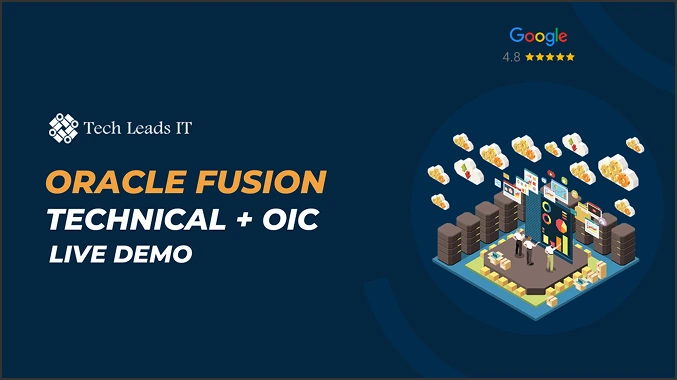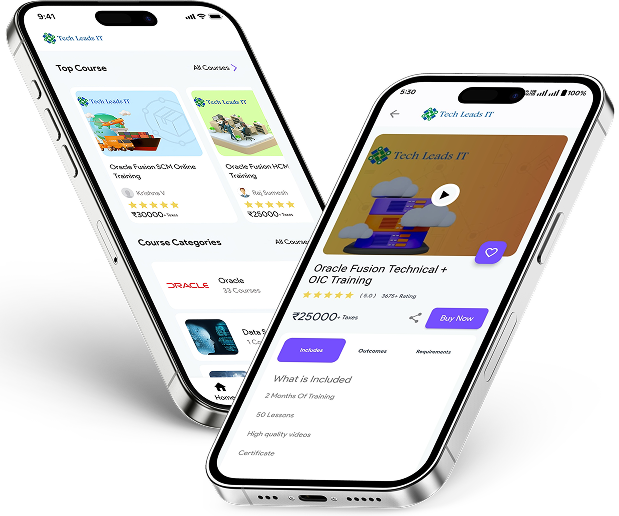Elevate your expertise
Best Seller
Master Oracle Fusion Technical At Tech Leads IT Expert Training.Redwood ExperienceAI With Technical+OIC
Accelerate your career in Oracle Cloud Development with our comprehensive Oracle Fusion Technical + OIC Training! Master integration concepts, gain hands-on experience, and build the skills needed to thrive in the evolving Oracle ecosystem with expert-led instruction.

Success Stories of Our Proud Achievers
Certified Success
Earn Your Badge of Excellence
Celebrate your success with an official certificate, proving your Oracle Fusion Technical & OIC expertise.

Official Certification
Earn a prestigious certificate upon successfully completing the course, validating your expertise in Oracle Fusion Technical and OIC.
Industry Recognition
Enhance your resume with a widely respected credential that demonstrates your proficiency in technical using Oracle tools.
Verifiable & Shareable
Receive a digital certificate with a unique verification link, allowing you to easily showcase your achievement on LinkedIn
Career Advancement
Gain in-depth knowledge and hands-on experience in Oracle Fusion Technical and OIC, helping you stand out from the competition
Insights from Top Industry Professionals
“Trusted by Visionaries Who Drive Supply Chain Innovation.
See Why They Recommend Our Course for Professionals Worldwide.”



Faq
Frequently Asked Questions
Our course covers key technical areas including BI Publisher, OTBI, Data Models, Technical Architecture, HDL (HCM Data Loader), FBDI, ADF, Web Services, SOAP/REST Integrations, Oracle Integration Cloud (OIC), and real-time use cases. For a detailed module list, please refer to our course syllabus.
Training sessions are conducted Monday to Saturday, with each class lasting 1 hour per day to provide a consistent and focused learning experience.
Currently, weekend batches are not available. Live sessions are held Monday to Saturday for a steady learning progression.
Yes, we provide recorded sessions for learners who prefer self-paced study. However, live doubt clarification sessions are not included in the self-paced option.
Yes, internship opportunities are available based on your performance in mock evaluations, allowing you to gain hands-on experience in Oracle Fusion Technical and OIC projects.
Downloads are not available through the web portal, but you’ll have secure access to all session recordings for 1 year. However, if you’re using our mobile learning app, you can download up to 20 videos to watch offline—ideal for learning without internet access.
No, the Oracle Fusion Technical + OIC course is offered as a comprehensive program, and individual modules cannot be taken separately.
Yes, we assist with building a professional resume tailored to Oracle Fusion Technical and OIC job roles, with guidance from our expert mentors.
Yes, a laptop or desktop is essential to access the cloud instance and complete technical configurations, integrations, and hands-on labs effectively.
Yes, basic knowledge of SQL is mandatory for this course. The program is designed for graduates from any academic background (Degree, PG, B.Tech, etc.), and no prior experience with Oracle is required, as the course begins with the fundamentals of Oracle Fusion Technical and OIC.
Yes, we start from the fundamentals and gradually move into advanced technical topics. This course suits both beginners and experienced professionals.
Yes, we support your job placement process through resume building, mock interviews, and career guidance. We also partner with companies such as Hitachi Vantara, Evosys, Tech Mahindra, LTI, and more.
Yes, we guide you through the certification process and provide sample questions and preparation tips for Oracle Fusion Technical and OIC certifications.
Yes, we offer daily recorded sessions and module-wise study materials, including implementation screenshots, navigation steps, and practical documentation.
Yes, we share frequently asked interview questions for each module and conduct mock interviews to prepare you for job opportunities.
Yes, you get 6 months of Oracle Cloud instance access for practical learning. No software installation is required—just access through a browser.
Yes, once you register, you receive 1-year access to attend multiple live batches of the Oracle Fusion Technical + OIC training.
Yes, you will receive an official Course Completion Certificate after successfully finishing the training.
Basic understanding of SQL, XML, and web services is helpful, but not mandatory. We teach from scratch and make it beginner-friendly.
Yes, personalized one-on-one training is available on request. Please note that one-on-one sessions are priced higher than group sessions.
Get in touch
Have questions or need assistance? Reach out to us via email or call our support team. We're here to help!"




































































